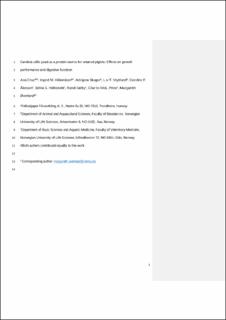Candida utilis yeast as a protein source for weaned piglets: Effects on growth performance and digestive function
Girio Da Costa Cruz, Ana Rita; Håkenåsen, Ingrid Marie; Skugor, Adrijana; Mydland, Liv Torunn; Åkesson, Caroline Piercey; Hellestveit, Selina Seyoum; Sørby, Randi; Press, Charles McLean; Øverland, Margareth
Abstract
Yeast such as inactivated Candida utilis produced from lignocellulosic biomass from underutilized wood co-products as a second-generation sugar source is a potentially sustainable protein feed ingredient in diets for piglets. This study aimed to evaluate the effects of C. utilis added to diets for weaned piglets on growth performance and digestive function when replacing main protein sources. Forty-eight piglets weaned at 30 days of age, with a mean starting weight of 11.06 ± 0.84 kg were fed one of four dietary treatments for 28 days: a conventional control diet with soybean meal, fishmeal, rapeseed meal, and potato protein or one of three experimental diets containing 10, 20 or 40% crude protein (CP) from yeast (CU10, CU20, and CU40, respectively). Adding yeast to diets did not affect growth performance compared with the control. The diet with 40% CP from C. utilis had higher apparent total tract digestibility (ATTD) of CP compared with the control (P = 0.034) and higher ATTD of ash (P < 0.001) compared with the control. The ATTD of neutral detergent fiber decreased in the CU40 diet compared with the control (P = 0.006). The apparent ileal digestibility (AID) of ash increased (P = 0.001) in the CU40 diet compared with the control, while the AID of CP and amino acids was unaffected. Villi-height increased in jejunum (P = 0.007) and ileum (P = 0.047), and villus-height: crypt-depth ratio increased (P = 0.001) in jejunum of piglets fed the CU40 diet compared with the control. Fecal dry matter increased linearly with increasing levels of C. utilis in the diets at day 7 after weaning (P = 0.001) and was higher for the CU40 group compared with the control group at day 21 after weaning (P = 0.027). Trypsin activity and messenger RNA expression of nine genes encoding for nutrient transporters in the jejunum did not differ among diets. Collectively, the results indicated that C. utilis can replace 40% of CP from the main protein sources traditionally used in diets for weaned piglets while maintaining growth and improving digestive function.

